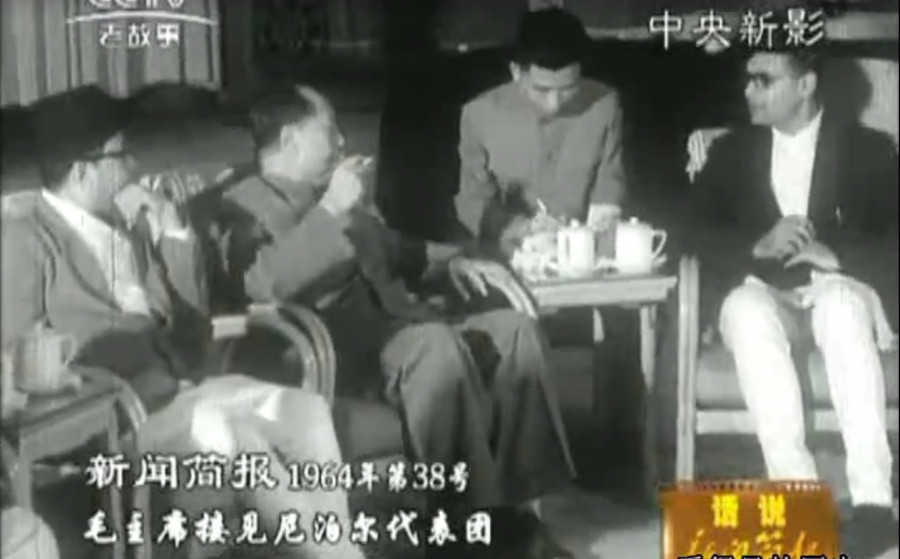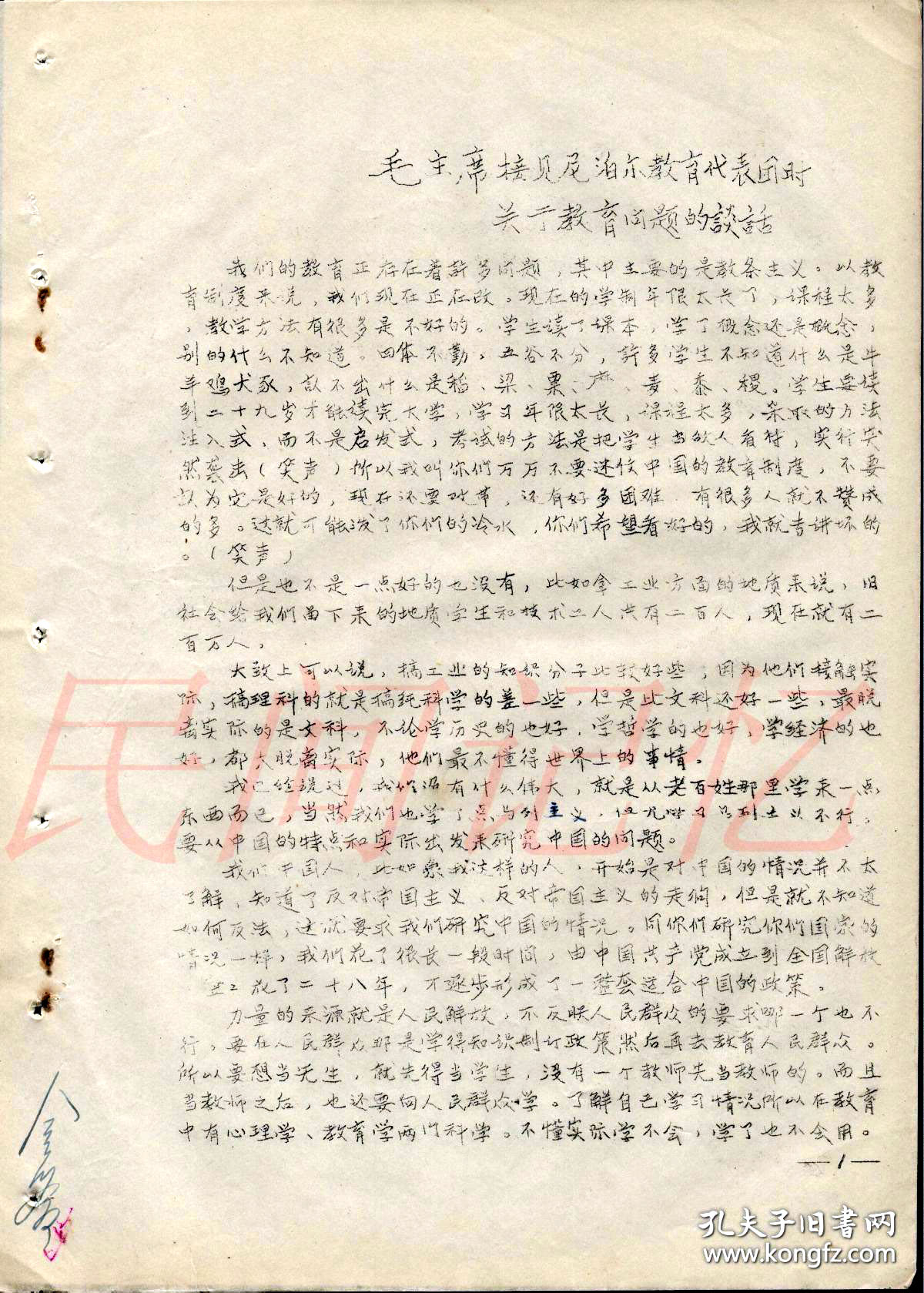Culture & Lifestyle
Mao’s conversation on education with Nepali delegation
When the Chinese leader met representatives from Nepal in 1964, he advised them not to put blind faith in the Chinese educational system.
(Context: On 29th August 1964, Mao Zedong received members of a Nepali education delegation led by Kesari Raj Pandey, under-secretary at the Ministry of Education. Among the delegation was a botanist, zoologist, linguist, writer and a political science professor.)
There are still many issues with our education (system), the chief of which is dogmatism. In terms of our education system, we are currently reforming it. The present schooling year is too long. There are too many courses and too many teaching methods, which is not good. Students either read textbooks or learn concepts but know nothing else. [They] do not use their four limbs; nor do [they] recognise the five kinds of grain*. Many children do not even know what cows, horses, chickens, dogs, and pigs are, nor can they tell the differences between rice, canary seeds, maize, wheat, millet, and sorghum**.
(*Quotation from the Analects by Confucius. They can neither do physical work nor distinguish rice from wheat.)
(**Quotation from San Zi Jing(‘The Three-character Classic’), a children’s classic.)
Students don't complete university until they're in their twenties. The years of study are too long. The courses are too many, and the teaching approach is injection rather than heuristics. The method of examination is to treat candidates as enemies and ambush them. (Laughs)
Therefore, I advise you not to entertain any blind faith in the Chinese educational system. Do not regard it as a good system. There are still many aspects to be reformed and many people disapprove of it. At present, there are few people in favour of the adoption of new method(s) and many who disapprove. I may be pouring cold water on you. You probably hoped to hear good, but I instead focused on the bad. (Laughs)
However, it is not like there is no good at all. Take industrial geology, for example. There were only 200 geologists and skilled workers left in the old society, and now there are more than 200,000.
Generally speaking, intellectuals engaged in industrial engineering are better because they are in touch with reality. Those who do science, that is, those who pursue pure science, are worse, but better than those into arts/humanities. The most detached from the reality is the arts/humanities. Whether it is history, philosophy, economics, they, too, are all detached from reality. They don't understand the things in the world.
As I have said, there is nothing great about us, but we have learned something from the people. Of course, we have also learned a little bit of Marxism-Leninism but only learning Marxism-Leninism is not enough. We must study China's problems from the perspective of China’s characteristics and facts.

We, the Chinese people, for example, people like me, did not know much about the situation in China at first. We knew how to fight imperialism and its running dogs but we did not know how to fight the French. This requires us to study the situation of China as you would study the situation in your country. It took us a long time from the establishment of the Communist Party of China to the liberation of the whole of China—it took 28 years to gradually form a policy suitable for China.
The source of [our] strength is the people. If something does not reflect the demands of the people, it is no good. It is necessary to learn from the people, formulate policies and then educate the people. So if you want to be a teacher, you have to be a student first. No teacher is a teacher first. Moreover, after becoming a teacher, s/he also has to learn from the people and understand his own learning situation. Therefore, there are two sciences: pedagogy psychology, and pedagogy. If you don’t know how to actually learn them, you won't be able to put it to use after you learn it.
Tsinghua University has a factory, which is a science and engineering school. Students who only have knowledge from books and do not work are not good enough. However, it is not easy to set up factories for arts/humanities in universities, and it is not suitable to set up a literature factory, history factory, economics factory or a novel factory. The arts/humanities should make the whole society its own factory. Teachers and students should have contact with farmers and urban workers, as well as with industry and agriculture. Otherwise, students will be of little use after graduation. If those who study law do not understand the situation of crime in the society, they cannot learn law well. There cannot be any law factory, but society should be the factory.
Therefore, the arts/humanities in my country is the most backward in comparison. There is too little contact with reality, whether in the case of the students or teachers. The philosophy taught in a classroom is the philosophy in books. If you don't learn philosophy in society and among the people, and you don't learn philosophy in the natural world, that kind of philosophy is useless, you just understand theory. The same is true of logic. You can read the text once, but you won't know much. You can only gradually understand it through application.
When I read logic, I didn’t truly understand it, but I gradually understood it when I used it. Here I am talking about logic. Also, for example, in literature, you need to learn grammar, but you don't know much when you read it; you need to understand the usefulness of grammar in writing. People write articles according to their habit, and speak according to their habit and they can do so without learning grammar. There has been no grammar in our country for thousands of years. But ancient people's writing was sometimes quite good. Of course I am not against learning grammar. As for rhetoric, you may or may not study it. Great writers are not rhetoricians. I also studied rhetoric but didn't understand it. Did you also learn rhetoric before writing articles?
—————————————————————————————————————
Full text: https://zhuanlan.zhihu.com/p/453689269
Translation by The Araniko Project




 9.7°C Kathmandu
9.7°C Kathmandu
.jpg&w=200&height=120)













